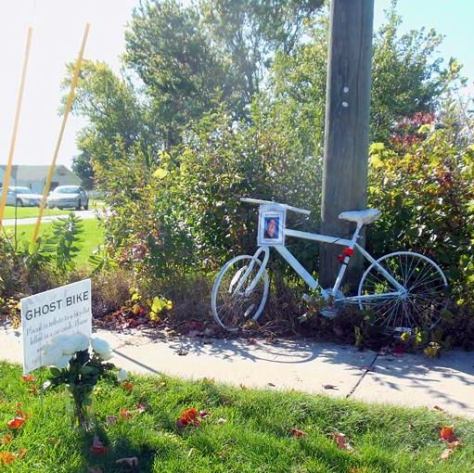
Any child of God deserves to have his life treated with dignity, to have the story of his life – and of his death – told with integrity. But this doesn’t always happen. It’s time for us to have a conversation – about life, about death, and about the stories we hear and tell.
Telling a story well can be uncomfortable. So can hearing a story well. Rather than receiving the story as it’s told, we may need to look a little more deeply into our own souls and re-examine what are sometimes ill-considered knee-jerk reactions. This is all the more essential when the “characters” in our stories are flesh and bone.
An excerpt from the story mentioned in the headline above:
A South Christian High School teacher who died after he was hit by a car as he rode his bicycle early Tuesday morning was wearing dark-colored clothing but had lights on his bike, Ottawa County sheriff’s officials said.
Rod VanDyke, a math teacher and girls varsity golf coach, was riding southbound on 36th Avenue near Jasper Drive in Georgetown Township when he was struck from behind by a 1999 Acura also traveling south. The crash occurred shortly before 6 a.m. Oct. 7.
Sgt. Steve Austin said investigation showed VanDyke was riding in the road, more than 8 feet from the edge. He was wearing black and gray clothing, and his bicycle had lights on the front and rear. Deputies found an MP3 player and headphones near him at the crash scene, Austin said. He was wearing a helmet.
***
Last year, a similar tragedy happened when a teacher on his way to Hamilton High School was killed in a collision with a a semi outside the Tulip City Truck stop. His name was Josh Hoppe.
The crash was described this way:
Hoppe was driving about 6:20 a.m. south on M-40, south of the I-196 interchange, when police say a truck pulled out into his path from Tulip City Truck stop.
He died at the scene after his 2009 Ford Fusion hit the trailer, near the cab of the truck driven by 54-year-old David St John of Wellston.
As the community grieved over Joshua Hoppe’s death, the public conversation was quickly filled with anger and determination. People called MDOT, filled City Council meetings, demanded traffic studies, reminded the powers-that-be that others had died here, too.
The community honored his life and demanded an accounting for his blood. What they didn’t do was question his decisions or character.
Incidentally, the community’s efforts were successful. MDOT is planning to make safety improvements to the road in 2016.
***
In researching this story, I read over a hundred media reports of car crashes involving bikes and pedestrians. I was encouraged by how many of them were neutral, including only the clear facts of what had happened.
But many were not. Too many followed a predictable script, script that reinforces our desire to believe our world is fair and orderly, and that tragedies like this are either inevitable or crushingly just. But this script quietly argues for a status quo that sees valued members of our communities and families unnecessarily killed every day – and then blames them for dying.
We don’t need to accept a script that far too often condemns the dead. On the contrary, this is a script that needs to be rewritten, and we have a right to insist that it is.
This is the first in a series on the stories we tell about the people who use our common roads in ways that our culture considers unconventional. Next time, we’ll look at how to identify the specific scripts we hear so we’re better able to push back against them when appropriate.
